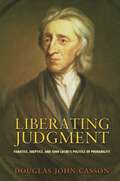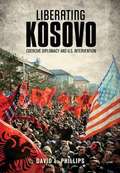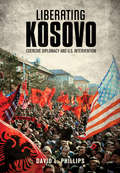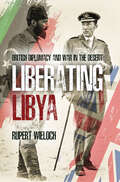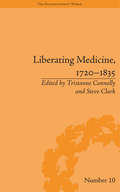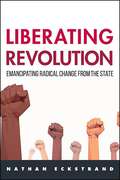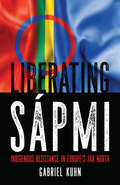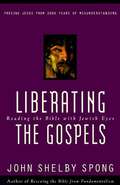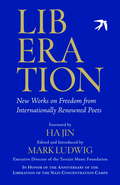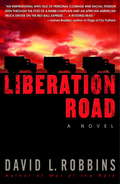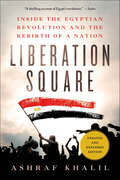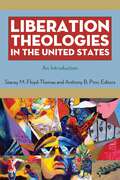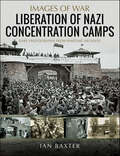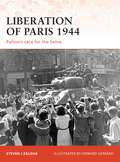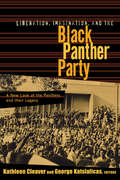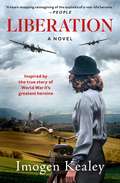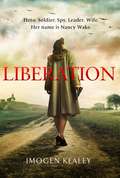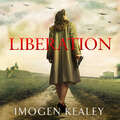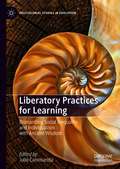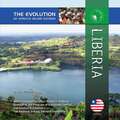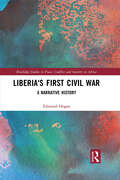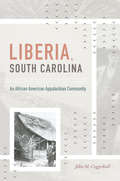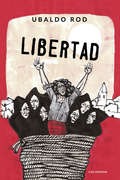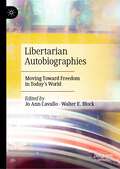- Table View
- List View
Liberating Judgment: Fanatics, Skeptics, and John Locke's Politics of Probability
by Douglas John CassonExamining the social and political upheavals that characterized the collapse of public judgment in early modern Europe, Liberating Judgment offers a unique account of the achievement of liberal democracy and self-government. The book argues that the work of John Locke instills a civic judgment that avoids the excesses of corrosive skepticism and dogmatic fanaticism, which lead to either political acquiescence or irresolvable conflict. Locke changes the way political power is assessed by replacing deteriorating vocabularies of legitimacy with a new language of justification informed by a conception of probability. For Locke, the coherence and viability of liberal self-government rests not on unassailable principles or institutions, but on the capacity of citizens to embrace probable judgment. The book explores the breakdown of the medieval understanding of knowledge and opinion, and considers how Montaigne's skepticism and Descartes' rationalism--interconnected responses to the crisis--involved a pragmatic submission to absolute rule. Locke endorses this response early on, but moves away from it when he encounters a notion of reasonableness based on probable judgment. In his mature writings, Locke instructs his readers to govern their faculties and intellectual yearnings in accordance with this new standard as well as a vocabulary of justification that might cultivate a self-government of free and equal individuals. The success of Locke's arguments depends upon citizens' willingness to take up the labor of judgment in situations where absolute certainty cannot be achieved.
Liberating Kosovo
by David L. PhillipsKosovo, after its incorporation into the Serbian Republic of Yugoslavia, became increasingly restive during the 1990s as Yugoslavia plunged into internal war and Kosovo's ethnic Albanian residents (Kosovars) sought autonomy. In March 1999, NATO forces began airstrikes against targets in Kosovo and Serbia in an effort to protect Kosovars against persecution. The bombing campaign ended in June 1999, and Kosovo was placed under transitional UN administration while negotiations on its status ensued. Kosovo eventually declared independence in 2008. Despite internal political tension and economic problems, the new nation has been recognized by many other countries and most of its inhabitants welcome its separation from Serbia. In Liberating Kosovo, David Phillips offers a compelling account of the negotiations and military actions that culminated in Kosovo's independence. Drawing on his own participation in the diplomatic process and interviews with leading participants, Phillips chronicles Slobodan Milosevic's rise to power, the sufferings of the Kosovars, and the events that led to the disintegration of Yugoslavia. He analyzes how NATO, the United Nations, and the United States employed diplomacy, aerial bombing, and peacekeeping forces to set in motion the process that led to independence for Kosovo. He also offers important insights into a critical issue in contemporary international politics: how and when the United States, other nations, and NGOs should act to prevent ethnic cleansing and severe human-rights abuses.
Liberating Kosovo: Coercive Diplomacy and U. S. Intervention (Belfer Center Studies in International Security)
by David L. PhillipsA compelling account of the diplomatic and military actions that led to Kosovo's independence and their implications for future U.S. and UN interventions.Kosovo, after its incorporation into the Serbian Republic of Yugoslavia, became increasingly restive during the 1990s as Yugoslavia plunged into internal war and Kosovo's ethnic Albanian residents (Kosovars) sought autonomy. In March 1999, NATO forces began airstrikes against targets in Kosovo and Serbia in an effort to protect Kosovars against persecution. The bombing campaign ended in June 1999, and Kosovo was placed under transitional UN administration while negotiations on its status ensued. Kosovo eventually declared independence in 2008. Despite internal political tension and economic problems, the new nation has been recognized by many other countries and most of its inhabitants welcome its separation from Serbia. In Liberating Kosovo, David Phillips offers a compelling account of the negotiations and military actions that culminated in Kosovo's independence. Drawing on his own participation in the diplomatic process and interviews with leading participants, Phillips chronicles Slobodan Milosevic's rise to power, the sufferings of the Kosovars, and the events that led to the disintegration of Yugoslavia. He analyzes how NATO, the United Nations, and the United States employed diplomacy, aerial bombing, and peacekeeping forces to set in motion the process that led to independence for Kosovo. He also offers important insights into a critical issue in contemporary international politics: how and when the United States, other nations, and NGOs should act to prevent ethnic cleansing and severe human-rights abuses.
Liberating Libya: British Diplomacy and War in the Desert
by Rupert WielochFree Libya! was the chant heard throughout Libya during the Arab Spring revolution that ended with the death of Colonel Gadaffi in October 2011. The story is about British involvement in Libya since the first treaty signed with the rulers in Tripoli in January 1692. The book is divided into four eras. The first covers the period up to the Italian invasion in 1911; the second covers the First World War and Italian pacification; the third covers the Western Desert Campaign; and the final part brings the reader up to date with recent events. In the words of the Foreign Secretary, Edward Grey, the 1911 Italian invasion of Libya “led straight to the catastrophe of 1914”. Using memoirs of politicians and correspondents from both sides of the conflict, the author pieces together British involvement, shedding new light on the Senussi Campaign and the Duke of Westminster’s rescue of 100 British PoWs at Bir Hakkeim, as well as the story of Colonel Milo Talbot, who did as much as TE Lawrence to establish British influence with Arab leadership, but was never rewarded for his work. Even though hundreds of books have been written about the Western Desert Campaign, this book includes much unpublished material in addressing the contentious issues and explains why General Brian Horrocks wrote: “Command in the desert was regarded as an almost certain prelude to a bowler hat”. The final part of the book begins with Britain’s operations to establish Libya as an independent kingdom and the rise of nationalism that led to Gadaffi’s coup in 1969. The story of the tense relationship with the Brotherly Leader during the “Line of Death” era and subsequent rapprochement precedes an authoritative account of the 2011 revolution. The final chapter, brings the reader up to date with the current conflict as well as the migration crisis and the Manchester Arena bombers.
Liberating Medicine, 1720–1835 (The Enlightenment World #10)
by Steve ClarkDuring the 18th century medicine became an autonomous discipline and practice. Surgeons justified themselves as skilled practitioners and set themselves apart from the unspecialized, hack barber-surgeons of early modernity. This title presents 17 essays on the relationship between medicine and literature during the Enlightenment.
Liberating Revolution: Emancipating Radical Change from the State (SUNY series in New Political Science)
by Nathan EckstrandLiberating Revolution challenges the idea that we understand what revolution is. All current understandings of revolution are different ways of portraying the state. To liberate revolution, we must explain radical change without determining its course or limiting what it can do. Nathan Eckstrand reviews earlier theories of revolution from history—social contract theory, Marxism, Hegelianism, liberalism, communism, totalitarianism, and Machiavellism—and studies how they describe political change. He then puts forth a new theory of change called Dynamic Anarchism, drawing on Event Ontology's discussions of radical change, systems theory's understanding of dynamic and adaptive systems, and anarchism's attempts to think of politics independent of the state. In its final chapter, Liberating Revolution advises how to produce radical change effectively. A valuable contribution to the ongoing discussion of how best to understand change given discoveries both microscopic and global, this book offers useful ideas to students curious about why revolutions often fail to achieve their goals or to anyone learning how change is depicted in political theory.
Liberating Sápmi: Indigenous Resistance in Europe's Far North
by Gabriel KuhnThe Sámi, who have inhabited Europe's far north for thousands of years, are often referred to as the continent's "forgotten people." With Sápmi, their traditional homeland, divided between four nation-states—Norway, Sweden, Finland, and Russia—the Sámi have experienced the profound oppression and discrimination that characterize the fate of indigenous people worldwide: their lands have been confiscated, their beliefs and values attacked, their communities and families torn apart. Yet the Sámi have shown incredible resilience, defending their identity and their territories and retaining an important social and ecological voice—even if many, progressives and leftists included, refuse to listen. Liberating Sápmi is a stunning journey through Sápmi and includes in-depth interviews with Sámi artists, activists, and scholars boldly standing up for the rights of their people. In this beautifully illustrated work, Gabriel Kuhn, author of over a dozen books and our most fascinating interpreter of global social justice movements, aims to raise awareness of the ongoing fight of the Sámi for justice and self-determination. The first accessible English-language introduction to the history of the Sámi people and the first account that focuses on their political resistance, this provocative work gives irrefutable evidence of the important role the Sámi play in the resistance of indigenous people against an economic and political system whose power to destroy all life on earth has reached a scale unprecedented in the history of humanity. The book contains interviews with Mari Boine, Harald Gaski, Ann-Kristin Håkansson, Aslak Holmberg, Maxida Märak, Stefan Mikaelsson, May-Britt Öhman, Synnøve Persen, Øyvind Ravna, Niillas Somby, Anders Sunna, and Suvi West.
Liberating the Gospels: Reading the Bible with Jewish Eyes
by John Shelby SpongIn this boldest book since Rescuing the Bible from Fundamentalism, Bishop John Shelby Spong offers a compelling view of the Gospels as thoroughly Jewish texts. Spong powerfully argues that many of the key Gospel accounts of events in the life of Jesus--from the stories of his birth to his physical resurrection--are not literally true. He offers convincing evidence that the Gospels are a collection of Jewish midrashic stories written to convey the significance of Jesus. This remarkable discovery brings us closer to how Jesus was really understood in his day and should be in ours.
Liberation
by Ha Jin Mark LudwigAn exploration of freedom by some of the world's most celebrated poets, published for the seventieth anniversary of the liberation of the Nazi camps The year 2015 marks the seventieth anniversary of the liberation of the Nazi concentration camps and the conclusion of the Second World War. But around the world, oppressed and imprisoned people are still longing for freedom and asking, "What does it mean to be free?" This collection of poems explores that question.In honor of this anniversary, some of the world's top contemporary voices--including Rita Dove, Robert Pinsky, Jay Parini, Yusef Komunyakaa, Agi Mishol, Tsering Woeser, Han Dong, Ernesto Santana, and Richard Blanco--have written poems on the theme of liberation as it inspires them personally and creatively. Nearly all of their poems are published for the first time in this volume.The result is an artistic representation of the universal yearning for freedom from twenty-five countries--and countless stories of oppression, imprisonment, and liberation. Here are Afghan women writing in secret, Tibetan and Cuban dissidents, memories and hopes inspired by topics from Fergusson to the Middle East, from illness to spirituality to joy in nature. This collection demonstrates the power of art to heal and to bring attention to freedom as a universal human right.Lyrical, uplifting, contemplative, sometimes angry, sometimes hopeful, always masterful, these are enduring poems to enrich and inspire.From the Trade Paperback edition.
Liberation Road: A Novel of World War II and the Red Ball Express
by David L. RobbinsJune 1944. The Allies deliver a staggering blow to Hitler's Atlantic fortress, leaving the beaches of Normandy strewn with corpses. The Germans have only one chance to stop the immense invasion - by bottling up the Americans on the Cotentin Peninsula. Caught up in the battles are two very different men, each with his own demons to fight. Joe Amos Biggs is a black driver in the unheralded convoy of trucks that serves as a precious lifeline to the front. Joe Amos finds himself propelled into battle among those who don't see him as an equal - but will need him to be a hero. A chaplain in the demoralized 90th Infantry, Rabbi Ben Kahn is a veteran of the first great war and old enough to be the father of the GIs he tends. Searching for the truth about his own son, missing in action, Kahn finds himself duelling with God, wading into combat without a gun, and becoming a leader among men in need of someone - anyone - to follow. The fates of these men will collide, hurtling toward an uncommon destiny in which people commit deeds they can neither foresee nor explain. From the screams of German . 88 cannons to the last whispers of dying young soldiers, Robbins captures war in all its awful fullness and leaves us with a memorable vision of humanity in the face of inhumanity itself.
Liberation Square: Inside the Egyptian Revolution and the Rebirth of a Nation
by Ashraf KhalilA definitive, absorbing account of the Egyptian revolution, written by a Cairo-based Egyptian-American reporter for Foreign Policy and The Times (London), who witnessed firsthand Mubarak's demise and the country's efforts to build a democracyIn early 2011, the world's attention was riveted on Cairo, where after three decades of supremacy, Hosni Mubarak was driven from power. It was a revolution as swift as it was explosive. For eighteen days, anger, defiance, and resurgent national pride reigned in the streets---protestors of all ages struck back against police and state security, united toward the common goal of liberation.But the revolution was more than a spontaneous uprising. It was the end result of years of mounting tension, brought on by a state that shamelessly abused its authority, rigging elections, silencing opposition, and violently attacking its citizens. When revolution bloomed in the region in January 2011, Egypt was a country whose patience had expired---with a people suddenly primed for liberation.As a journalist based in Cairo, Ashraf Khalil was an eyewitness to the perfect storm that brought down Mubarak and his regime. Khalil was subjected to tear gas alongside protestors in Tahrir Square, barely escaped an enraged mob, and witnessed the day-to-day developments from the frontlines. From the halls of power to the back alleys of Cairo, he offers a one-of-a-kind look at a nation in the throes of an uprising.Liberation Square is a revealing and dramatic look at the revolution that transformed the modern history of one of the world's oldest civilizations.
Liberation Theologies in the United States: An Introduction
by Stacey M Floyd-Thomas Anthony B PinnLiberation Theologies in the United States reveals how the critical use of religion can be utilized to challenge and combat oppression in America. In the nascent United States, religion often functioned as a justifier of oppression. Yet while religious discourse buttressed such oppressive activities as slavery and the destruction of native populations, oppressed communities have also made use of religion to critique and challenge this abuse. As Liberation Theologies in the United States demonstrates, this critical use of religion has often taken the form of liberation theologies, which use primarily Christian principles to address questions of social justice, including racism, poverty, and other types of oppression. Stacey M. Floyd-Thomas and Anthony B. Pinn have brought together a stellar group of liberation theology scholars to provide a synthetic introduction to the historical development, context, theory, and goals of a range of U.S.-born liberation theologies: Black Theology—Anthony B. Pinn Womanist Theology—Stacey M. Floyd-Thomas Latina Theology—Nancy Pineda-Madrid Hispanic/Latino(a) Theology—Benjamín Valentín Asian American Theology—Andrew Sung Park Asian American Feminist Theology—Grace Ji-Sun Kim Native Feminist Theology—Andrea Smith Native American Theology—George (Tink) Tinker Gay and Lesbian Theology—Robert E. Shore-Goss Feminist Theology—Mary McClintock Fulkerson &“An extraordinary resource for understanding the vitality of liberation theologies and their relation to social transformation in the changing U.S. context. Written in an accessible and engaged way, this powerful and informative text will inspire beginners and scholars alike. I highly recommend it."—Kwok Pui-lan, author of Postcolonial Imagination and Feminist Theology &“A delight to read . . . [and] an exemplary account of the genre of liberation theologies." ―Religious Studies Review
Liberation of Nazi Concentration Camps
by Ian Baxter"A very nice reference book that contains a well written informative text, many subject specific photographs, well detailed captions and more, all detailing the liberation of the Nazi concentration camps by allied forces during World War II." —Armorama As the Allies closed in on Hitler’s Germany the horror and scale of the Final Solution and concentration camps became all too apparent. This latest Images of War book provides the reader a truly disturbing insight into the Nazi’s brutal regime of wholesale murder, torture and starvation. While the Germans attempted to hide the evidence by demolishing much of the camps’ infrastructure, the pace of the Soviets’ advance through Poland meant that the gas chambers at Majdenak near Lublin were captured intact. Auschwitz had received over a million deportees yet when liberated in January 1945 only a few thousand prisoners were there as the vast majority of surviving prisoners had been sent on forced death marches to more westerly camps such as Ravensbruch and Buchenwald. Condition in these camps deteriorated further due to overcrowding and the spread of deadly diseases. In every camp shocking scenes of death and starvation were encountered. When British troops reached Bergen-Belsen in April 1945, there were some 10,000 unburied dead in addition to the mass graves, in addition to 60,000 starving and sick inmates in utterly appalling conditions. The words and images in this disturbing book are a timely reminder of man’s inhumanity to his fellows and that such behavior should never be repeated.
Liberation of Paris 1944
by Steven Zaloga Howard GerrardIn July 1944 of World War II (1939-1945), Operation Cobra broke the stalemate in Normandy and sent the Allies racing across France. The Allied commanders ignored Paris in their planning for this campaign, considering that the risk of intense street fighting and heavy casualties outweighed the city's strategic importance. However, Charles de Gaulle persuaded the Allied commanders to take direct action to liberate his nation's capital. Steven J Zaloga first describes the operations of Patton's Third Army as it advanced towards Paris before focusing on the actions of the Resistance forces inside the city and of the Free French armored division that fought its way in and joined up with them to liberate it on August 24. De Gaulle could then proclaim, "Paris liberated!" and one of the world's loveliest cities had survived Hitler's strident command that it should be held at all costs or reduced to rubble.
Liberation, Imagination and the Black Panther Party: A New Look at the Black Panthers and their Legacy (New Political Science Reader)
by Kathleen Cleaver George KatsiaficasThis fascinating book gathers reflections by scholars and activists who consider the impact of the Black Panther Party, the BBP, the most significant revolutionary organization in the later 20th century.
Liberation: Inspired By The Incredible True Story Of World War Ii's Greatest Heroine Nancy Wake
by Imogen KealeyHero. Soldier. Spy. Leader. Her name is Nancy Wake. The international bestseller -- a "thrilling debut" and "cinematic treat" -- inspired by the true story of World War II's greatest heroine (Publishers Weekly). p.p1 {margin: 0.0px 0.0px 0.0px 0.0px; font: 12.0px 'Times New Roman'} To the Allies, she was a fearless freedom fighter, a special operations legend, a woman ahead of her time. To the Gestapo, she was a ghost, a shadow, the most wanted person in the world. But at first, Nancy Wake was just another young woman living in Marseilles and recently engaged to a man she loved. Then France fell to the Nazi blitzkrieg. With her appetite for danger, Nancy quickly finds herself drawn into the underground Resistance standing up to Nazi rule. Gaining notoriety as the White Mouse, with a 5-million-franc bounty hanging over her head, Wake rises to the top of the Nazi's Most Wanted list -- only to find her husband arrested for treasonous activity under suspicion of being the White Mouse himself. Narrowly escaping to Britain, Wake joins the Special Operations Executive (SOE) and parachutes into the Auvergne, where she must fight for the respect of some of the toughest Resistance fighters in France. As she and her maquisards battle the Nazis, their every engagement brings the end of the war closer -- but also places her husband in deeper peril. A riveting, richly imagined historical thriller, LIBERATION brings to life one of World War II's most fascinating unsung heroines in all her fierce power and complexity. This is the story of one of the one of the war's most decorated women, told like never before.
Liberation: Inspired by the incredible true story of World War II's greatest heroine Nancy Wake
by Imogen KealeyInspired by the incredible true story of the most decorated servicewoman of the second world war. Nancy Wake was an Australian girl who, aged, 16 ran away from her abusive mother to the other side of the world.Nancy Wake was a wife who, when her husband was snatched by the Gestapo, fought to be trained by SOE and returned to France to take her revenge.Nancy Wake was a soldier who led a battalion of 7,000 French Resistance fighters who called her Field Marshall. Who had a 5-million Franc bounty on her head. Who killed a Nazi with her bare hands. Who defeated 22,000 Germans with the loss of only 100 men. Who sold her medals because, "I'll probably go to hell and they'd melt anyway."Discover the roots of her legend in a thriller about one woman's incredible quest to turn the tide of the war, save the man she loves and take revenge on those who have wronged her.
Liberation: Inspired by the incredible true story of World War II's greatest heroine Nancy Wake
by Imogen KealeyThe must-read thriller inspired by the true story of Nancy Wake, whose husband was kidnapped by the Nazis and became the most decorated servicewoman of the Second World War - soon to be a major blockbuster film.To the Allies she was a fearless freedom fighter, special operations super spy, a woman ahead of her time. To the Gestapo she was a ghost, a shadow, the most wanted person in the world with a five-million-Franc bounty on her head. Her name was Nancy Wake.Now, for the first time, the roots of her legend are told in a thriller about one woman's incredible quest to turn the tide of the war, save the man she loves and take brutal revenge on those who have wronged her.
Liberatory Practices for Learning: Dismantling Social Inequality and Individualism with Ancient Wisdom (Postcolonial Studies in Education)
by Julio CammarotaThis book promotes collaborative ways of knowing and group accountability in learning processes to counteract the damaging effects of neoliberal individualism prevalent in educational systems today. These neoliberalist hierarchies imposed through traditional, autocratic knowledge systems have driven much of the United States’ educational policies and reforms, including STEM, high stakes testing, individual-based accountability, hierarchical grading systems, and ability grouping tracks. The net effect of such policies and reforms is an education system that perpetuates social inequalities linked with race, class, gender, and sexuality. Instead, the author suggests that accountability pushes past individualism in education by highlighting democratic methods to produce a collective good as opposed to a narrow personal success. In this democratic model, participants contribute to the common goal of elevating the entire group. Drawing from a well of creative praxes, reflexivity, and spiritual engagement, contributors incorporate collective dreaming to envision alternate realities of learning and schooling and summon the spirit into action for change.
Liberazione Della Donna: Feminism in Italy
by Lucia C. BirnbaumA survey of the history and modern transformation of the Italian feminist movement.
Liberia (The Evolution of Africa's Major Nations)
by Brian BaughanThe early history of Liberia was promising. Under the auspices of white Americans, freed slaves had been offered a new home in the West African region during the early 19th century. In 1847 the settlers founded the continent's first independent republic--a full century before the rest of Africa began to shake off colonial rule. Although the new republic modeled itself on the United States--and even named its cities after U.S. leaders--it has nevertheless endured sluggish development, class division, and a brutal civil war during the 1990s that resulted in 200,000 deaths. In their struggle for stability, the Liberian people have forged peace agreements between the warring political parties and established a new, freely elected government in 2006, becoming the first African country to elect a woman as president.
Liberia's First Civil War: A Narrative History (Routledge Studies in Peace, Conflict and Security in Africa)
by Edmund HoganThis book provides a comprehensive narrative history of Liberia’s first civil war, from its origins in the 1980s right through the conflict and up to the peace agreement and conclusion of hostilities in 1997. The first Liberian Civil War was one of Africa’s most devastating conflicts, claiming the lives of more than 200,000 Liberians, and sending shockwaves across the world. Drawing on a wide range of local and international sources, the book traces the background of the war and its long-term and immediate causes, before analysing the detail of the unfolding conflict, the eventual ceasefire, peace agreement and subsequent elections. In particular, the book shines a light on hitherto unseen first-hand Roman Catholic indigenous and missionary sources, which offer a rare intimacy to the analysis. Detailing the impact of Liberia’s individual warlords and peacemakers, the book also explains the roles played by non-governmental agencies, national, regional and international actors, by the UN, ECOWAS and the Organisation of African Unity, and by nations with special interests and influence, such as the USA and other West African states. This book’s detailed narrative analysis of the Liberian conflict will be an important read for anyone with an interest in the Liberian conflict, including researchers within African studies, political science, contemporary history, international relations, and peace and conflict studies.
Liberia, South Carolina: An African American Appalachian Community (H. Eugene and Lillian Youngs Lehman Series)
by John M. CoggeshallIn 2007, while researching mountain culture in upstate South Carolina, anthropologist John M. Coggeshall stumbled upon the small community of Liberia in the Blue Ridge foothills. There he met Mable Owens Clarke and her family, the remaining members of a small African American community still living on land obtained immediately after the Civil War. This intimate history tells the story of five generations of the Owens family and their friends and neighbors, chronicling their struggles through slavery, Reconstruction, the Jim Crow era, and the desegregation of the state. Through hours of interviews with Mable and her relatives, as well as friends and neighbors, Coggeshall presents an ethnographic history that allows members of a largely ignored community to speak and record their own history for the first time. This story sheds new light on the African American experience in Appalachia, and in it Coggeshall documents the community's 150-year history of resistance to white oppression, while offering a new way to understand the symbolic relationship between residents and the land they occupy, tying together family, memory, and narratives to explain this connection.
Libertad
by Ubaldo Rod¿Qué se creían aquellos locos, acaso que las cosas se podían cambiar? En 1873 se proclama la I República. Los deseos de cambio se extienden por todo el país. En la aldea de Casas de Don Antonio, pegada al Guadalquivir, los hombres abandonan la pesca del esturión y se unen a los voluntarios de la República, participando en la rebelión cantonal. Solas, sus mujeres tienen que salir adelante por sí mismas. Al mismo tiempo, se instala allí un campo de prisioneros de la tercera guerra carlista. Como tienen bastante libertad de movimientos, no tardan en intimar cada vez más profundamente con ellas, hasta el día en que tienen que marcharse. Pero las desgracias para las mujeres no acaban ahí, pues después de muchos años de prisión regresan sus maridos, mucho más embrutecidos que cuando se fueron. Incapaces de aceptar todo lo que ellas han logrado en su ausencia, intentarán que las cosas sean de nuevo como antes, lo que conducirá a un final trágico para todos.
Libertarian Autobiographies: Moving Toward Freedom in Today’s World
by Jo Ann Cavallo Walter E. BlockInfluential libertarians from diverse backgrounds and professions who have worked toward a freer society across the globe share their personal and intellectual journeys, including what their lives and thoughts were before they embraced libertarianism; which people, texts, or events most inspired them; what experiences, challenges, tribulations, and achievements they have had as participants or leaders in this movement, and how this philosophy has affected their private and professional lives. The volume’s 80 contributors span the political-philosophical spectrum of libertarianism, including anarcho-capitalists, minarchists, constitutionalists, classical liberals, and thick libertarians. Their essays express different perspectives on many issues even while articulating such core principles as an appreciation for individual liberty, private property rights, the rule of law, and free enterprise. Together, they represent myriad individual journeys toward libertarianism, however defined. By bringing together a range of contemporary voices from outside the dominant left-right paradigm, this book aims to contribute to the viewpoint diversity that is crucially needed in today’s public discourse. These autobiographies not only offer compelling insights into their individual authors and the state of the world today, but may also inspire the next generation to make our society a freer one.
